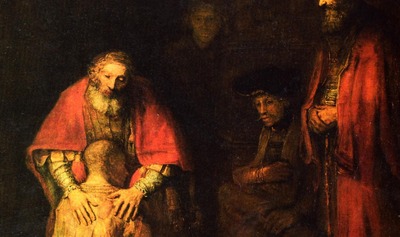Fourth Sunday of Lent
March 30, 2025 — Year C
Readings: Josh 5:9a, 10-12 / Ps 34 / 2 Cor 5:17-21 / Lk:1-3, 11-32
by Rev. Nixon Negparanon, Pastor
The fourth Sunday of Lent, often called Laetare Sunday, is a day of joyful anticipation as we draw closer to Easter. The readings today reveal God’s boundless mercy, and His call for us to be reconciled with Him. Each passage invites us to reflect on God’s transformative love that restores us to grace and calls us home.
In our first reading today, the Israelites have just crossed the Jordan River into the promised land. The Lord declares to Joshua, “Today I have removed the reproach of Egypt from you.” This moment marks a turning point. The people who had wandered in the desert for forty years now experience the fulfillment of God’s promise. They celebrate the Passover, no longer dependent on manna, but now eating from the produce of the land. This highlights God’s faithfulness in bringing His people from slavery to freedom, from exile to home. Just as God provided for the Israelites, He continually offers us the nourishment we need, both physically and spiritually.
Saint Paul speaks of a powerful transformation. Whoever is in Christ is a new creation. The old things have passed away. Behold, new things have come. Paul emphasizes that through Christ’s death and resurrection, we have been reconciled with God. He describes this reconciliation as a gift entrusted to us. We are now called to be ambassadors for Christ, sharing His message of mercy with the world. This reminds us that Lent is a time for renewal; no matter how far we have strayed, God offers us a fresh beginning, inviting us to be instruments of peace and reconciliation.
The familiar parable of the prodigal son is a powerful illustration of God’s mercy. The younger son squanders his inheritance, but eventually returns home, prepared to beg for forgiveness. Yet, before he can finish his confession, his father runs to embrace him, clothing him in a robe and celebrating his return with a feast. The elder son struggles to understand such mercy, questioning why his loyalty was not similarly rewarded.
The parable of the prodigal son highlights the stark differences, yet profound similarities between the younger and older sons, reflecting our own lives. The younger son’s realization and decision to return home underscore the importance of acknowledging one’s mistake and seeking reconciliation.
The father’s response illustrates unconditional love and the joy of recovery, emphasizing that redemption is always possible. This reveals the heart of God, a father who seeks us out, welcomes us home, and rejoices in our repentance. The father’s actions reflect what Pope Francis has called the joy of the Gospel. “God never tires of forgiving us. We are the ones who tire of seeking His mercy.” The father in the parable runs to his son, emphasizing the need for healing, a reality many of us face.
While the younger son experiences regret after leaving, the older son who stays home in obedience grapples with resentment and the desire for recognition. Both sons demonstrate the need for acceptance and healing, highlighting that, regardless of our choices, we all long for connection and understanding. The parable also challenges us to examine our hearts. Are we like the younger son, needing to return to God? Or are we like the elder son, struggling to embrace God’s mercy for others?
Being embraced by the Father is pivotal in understanding Christianity, which hinges on the question of whether one allows God to love them as they are. Despite God’s invitation to join in His celebration, the refusal to grant permission to be loved can create barriers to acceptance. Ultimately, the final step toward receiving this love lies in personal consent.
All three readings center on themes of renewal, reconciliation, and God’s abundant mercy. In Joshua, God restores His people to the promised land. In Corinthians, Paul proclaims that God makes us new through Christ. In the gospel, Jesus reveals God as a father who welcomes sinners home. Together, these readings remind us that no sin is greater than God’s mercy, and no distance is too far for God to reach.
Brothers and sisters, our Church reminds us that God’s mercy is central to His identity. God reveals His fatherly omnipotence by His infinite mercy, for He displays His power at its heights by freely forgiving sins. The parable of the prodigal son reflects this truth. God’s greatest strength is His ability to forgive, heal, and restore.
As we continue our Lenten journey, let us examine our own need for mercy. In our fast-paced world, pride and self-reliance can blind us to our need for God’s forgiveness. Lent offers us a chance to reflect deeply and seek the sacrament of reconciliation.
Let us also embrace those who have wandered. Like the merciful Father, we are called to welcome back those who have strayed from the Church. A kind word, a listening ear, or an invitation to Mass can be a powerful gesture of reconciliation. As Christians, we are called to be ambassadors of mercy, especially in today’s world where judgement and division are common. We are called to practice forgiveness, whether in our families, workplaces, or communities. Showing compassion to those who hurt us reflects God’s mercy in action.
Our readings this Sunday remind us that our God is a God of second chances, whether we are the younger son in need of forgiveness, or the elder son called to embrace mercy. God invites us all to the feast. May we accept this invitation, trusting in His love that never fails.
Father, I have sinned against Heaven and against you. May these words be the beginning of our journey back to the Father’s embrace.
 540-586-8988
540-586-8988 

